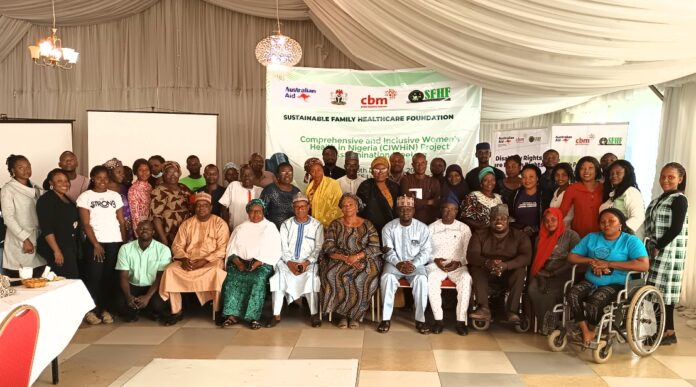Sustainable Family Healthcare Foundation(SFHF) on 8th December, 2022 organized a one-day dissemination meeting for stakeholders on implementing the comprehensive &inclusive women’s health in Nigeria (CIWHIN) project in FCT and northwest Nigeria with special focus on obstetric fistula prevention and management and persons with disabilities. this project is supported by CBM global disability inclusion
Mrs. Peter Ogumayi, the Executive Director, SFHF in her opening remark expressed her profound gratitude to the donors, CBM international, Australian government and CBM global for the financial and technical support throughout the lifespan of the project, which has contributed to the growth of the organisation and impacted the lives of women across all project locations.
SFHF acknowledged the partnership, support and contributions of the states and non-state actors towards the successful implementation of the CIWHIN project in FCT and kastina state. She also recognized the role of federal ministry of health FMOH, federal ministry of women affairs FMWA, federal ministry of humanitarian and disaster management, National Orientation agency, FCT primary healthcare board, FCT health management board, Katsina State ministry of health, state primary healthcare, state ministry of women affairs and health including Kebbi, and Zamfara state ministry of health, the HODs health, coordinators health educators in LGAs and FCT
She appreciated the Kwali general hospital, and all their centers in FCT and other states for their commitment throughout the project, organizations of persons with disabilities OPDs and media houses for demonstrating immense support by contributing to awareness creation to the general public on VVF and inclusion of PWDs in Nigeria.
Dr. Shuaibu Yusuf, Director, Clinical Services and Training, NOFIC Kastina in his message said the patients are usually very poor and abandoned by their families; they cannot afford medical care or feed themselves. The center offers services ranging from free admission, no hospital fee, free post-operative medications, as well as rehabilitation after treatment. SFHF is of great importance and assistance of our center, they supported us to run the hospital with diesel, consumables, and medication for fistula care and elective caesarean sections to ensure we can provide free services to our patients.
Matron Victoria Akhigbe, Fistula nurse, Kwali general hospital in her speech appreciated SFHF for an impactful work in Kwali general hospital and she mentioned that there are women that have gone about five times to several places, they have spent money and they keep going from one place to the other. Sometimes, because they could not afford the cost, they remain like that, until they got to know about this program that has been organized by SFHF; free repair, free surgery, free opportunity, free hope given to these women.
Jamila Sani, Deputy Director, Nursing Services, NOFIC Katsina, SFHF helps our patients with dignity kits during discharge; the organisation has also trained our nurses on antenatal care (ANC) and emergency obstetric and newborn care we thank SFHF for the support and assistance given to us and our patients.
Some milestone that SFHF has successfully achieved through the CIWHIN project are; the decrease in incidence of untreated obstetric fistula, they have also significantly reduced stigma of women and girls with disabilities and reproductive health needs, improvement in the household residual income of women and girls who benefitted from livelihood support, and increased access and satisfaction of women and reproductive health services.
Result areas on CIWHIN project was voice and capacity of women and girls with disabilities are increased for greater inclusion in national and state and reproduction health programs, local health facilities have improved capacity in delivery of maternal and child health services including prevention and treatment of fistula, SFHF programme management and organizational development capacity has improved for quality project implementation, and finally women and girls have increased understanding on sexual and reproductive health and rights leading to improved health-seeking behavior.


